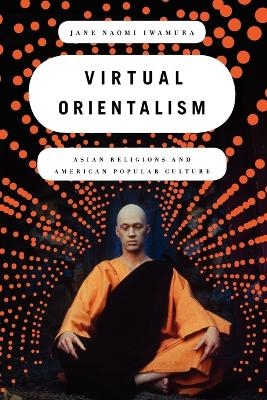
Virtual Orientalism
Asian Religions and American Popular Culture
Seiten
2011
Oxford University Press Inc (Verlag)
978-0-19-973861-8 (ISBN)
Oxford University Press Inc (Verlag)
978-0-19-973861-8 (ISBN)
Jane Iwamura examines contemporary fascination with Eastern spirituality and provides a cultural history of the representation of Asian religions in American mass media. At the heart of her study is the Oriental Monk, a non-sexual, solitary, conventionalized icon who generously and purposefully shares his wisdom with the West.
Saffron-robed monks and long-haired gurus have become familiar characters on the American pop culture scene. Jane Iwamura examines the contemporary fascination with Eastern spirituality and provides a cultural history of the representation of Asian religions in American mass media. Initial engagements with Asian spiritual heritages were mediated by monks, gurus, bhikkhus, sages, sifus, healers, and masters from a wide variety of ethnic backgrounds and religious traditions. Virtual Orientalism shows the evolution of these interactions, from direct engagements with specific individuals, to mediated relations with a conventionalized icon. Visually and psychically compelling, the Oriental Monk becomes for Americans a ''figure of translation'' - a convenient symbol for alternative spiritualities and modes of being. Through the figure of the non-sexual, solitary Monk, who generously and purposefully shares his wisdom with the West, Asian religiosity is made manageable - psychologically, socially, and politically - for American popular culture.
Saffron-robed monks and long-haired gurus have become familiar characters on the American pop culture scene. Jane Iwamura examines the contemporary fascination with Eastern spirituality and provides a cultural history of the representation of Asian religions in American mass media. Initial engagements with Asian spiritual heritages were mediated by monks, gurus, bhikkhus, sages, sifus, healers, and masters from a wide variety of ethnic backgrounds and religious traditions. Virtual Orientalism shows the evolution of these interactions, from direct engagements with specific individuals, to mediated relations with a conventionalized icon. Visually and psychically compelling, the Oriental Monk becomes for Americans a ''figure of translation'' - a convenient symbol for alternative spiritualities and modes of being. Through the figure of the non-sexual, solitary Monk, who generously and purposefully shares his wisdom with the West, Asian religiosity is made manageable - psychologically, socially, and politically - for American popular culture.
Assistant Professor, School of Religion and Department of American Studies and Ethnicity, University of Southern California
Acknowledgements ; Introduction ; Zen's Personality - D.T. Suzuki ; Hyperreal Samadhi - Maharishi Mahesh Yogi ; The Monk Goes Hollywood - Kung Fu ; Conclusion - Spiritual Romance Today ; Bibliography ; Index
| Erscheint lt. Verlag | 24.2.2011 |
|---|---|
| Verlagsort | New York |
| Sprache | englisch |
| Maße | 231 x 155 mm |
| Gewicht | 340 g |
| Themenwelt | Kunst / Musik / Theater ► Film / TV |
| Geisteswissenschaften ► Religion / Theologie ► Buddhismus | |
| Geisteswissenschaften ► Religion / Theologie ► Hinduismus | |
| Sozialwissenschaften | |
| ISBN-10 | 0-19-973861-0 / 0199738610 |
| ISBN-13 | 978-0-19-973861-8 / 9780199738618 |
| Zustand | Neuware |
| Haben Sie eine Frage zum Produkt? |
Mehr entdecken
aus dem Bereich
aus dem Bereich
Philosophische Betrachtungen
Buch | Softcover (2024)
Aufbau TB (Verlag)
12,00 €
Unterweisungen in Zen-Meditation
Buch | Hardcover (2024)
Arkana (Verlag)
20,00 €


